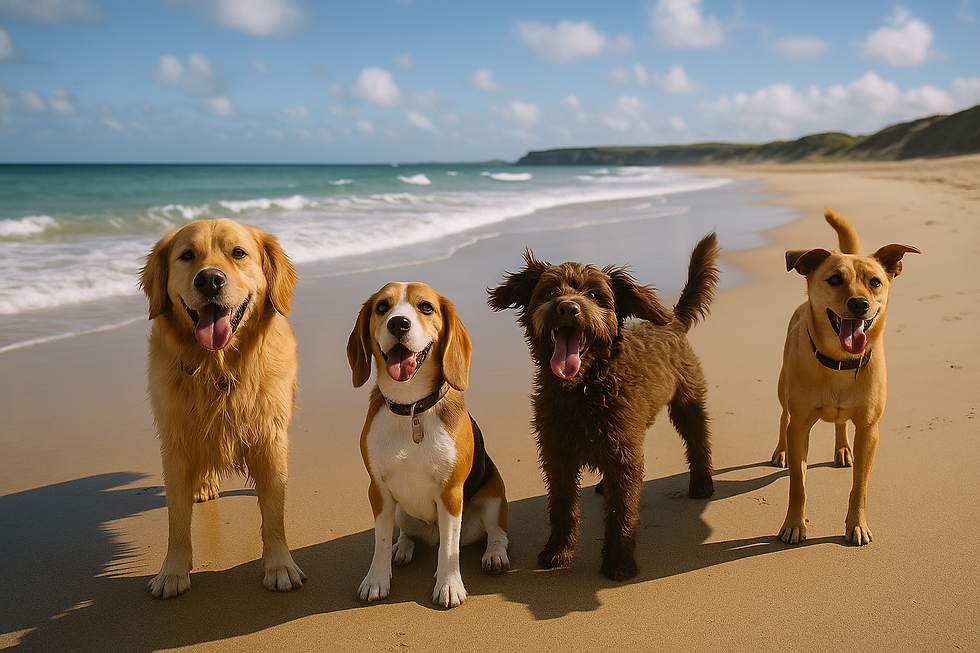How to Help a Pet That’s Overheating While Travelling – A Pet Taxi Guide
- pettaxiltd
- Apr 15
- 4 min read
Travelling with your furry friend should be a comfortable and safe experience. However, warm weather or long journeys can sometimes lead to your pet overheating — a condition that can be dangerous if not handled quickly and correctly. At Pet Taxi UK, we’re committed to providing not just reliable pet taxi services, but also expert care and advice to ensure every journey is a happy one.
In this blog, we’ll guide you through how to recognise signs of overheating, how to cool your pet down safely, and tips to prevent overheating during travel.
Why Pets Overheat While Travelling
Unlike humans, pets don’t sweat through their skin. They mostly regulate body temperature through panting and, in dogs, small sweat glands in their paws. During travel — especially in warm weather or enclosed spaces — pets can struggle to stay cool.
Stress, poor ventilation, direct sunlight, or unsuitable transport conditions can quickly increase their body temperature. This is why professional pet taxi services like ours use climate-controlled vehicles and take every precaution to ensure your animal’s comfort and safety.

Signs Your Pet Is Too Hot
It’s crucial to recognise the early symptoms of heat stress or heatstroke. Look out for:
Excessive panting or drooling
Bright red tongue or gums
Rapid heartbeat
Weakness or lethargy
Vomiting or diarrhoea
Glazed eyes or confusion
Collapse or unresponsiveness (in severe cases)
These signs can develop rapidly, so quick action is essential.
Immediate Steps to Help an Overheating Pet
If you suspect your pet is suffering from heat exhaustion or heatstroke while travelling, take the following steps immediately:
1. Stop and Move to a Cool Area
Pull over safely and get your pet into a shaded, well-ventilated area as soon as possible. If you're travelling in a vehicle, turn on the air conditioning or open windows to let air circulate.
2. Offer Cool (Not Cold) Water
Let your pet drink small amounts of cool water. Avoid forcing them to drink, and don’t use ice-cold water, which can shock their system.
3. Cool Down the Body
Use a damp towel or cloth to gently wet their paws, ears, and belly. These areas help regulate body temperature. You can also place the towel on them or let them lie on it. Do not drench them in cold water, especially if they are already in distress.
4. Use Air Movement
If you have a fan or air conditioning, use it to help lower your pet’s temperature. This works even more effectively when their fur is slightly damp.
5. Call a Vet
Even if your pet seems to recover, contact a vet. Heatstroke can have delayed effects, including organ damage. A professional check-up ensures your pet is truly out of danger.
Prevention is Better Than Cure: Travel Tips from a Pet Taxi Professional
As experienced animal transport specialists, we know that preventing overheating is far better than treating it. Here’s how you can make your journeys safer:
1. Use a Professional Pet Taxi Service
Booking with a trusted provider like Pet Taxi UK means your pet will travel in a well-ventilated, temperature-regulated vehicle with trained handlers. We understand animal behaviour and know how to keep your companion calm and cool.
2. Travel During Cooler Hours
Plan your journey for early morning or late evening when temperatures are naturally lower. Avoid travelling during the hottest parts of the day (usually between 11 am and 3 pm).
3. Never Leave a Pet Alone in a Car
Even on a mild day, the temperature inside a car can rise dangerously fast. It can become fatal within minutes, even with windows cracked open.
4. Pack Cooling Essentials
Bring items such as:
Portable water bowls
Cooling mats
Damp towels
Pet-safe electrolyte water or hydration supplements
5. Keep the Journey Calm
Stress can increase body temperature. Use calming sprays, familiar bedding, or favourite toys to keep your pet relaxed during the trip.
Special Considerations for Certain Pets
Some pets are more prone to overheating than others. These include:
Flat-faced breeds (e.g., Bulldogs, Pugs, Persians)
Senior pets
Overweight animals
Pets with thick or long coats
These animals require even more care and planning during travel. When you book a pet taxi with us, we ask for these details in advance to tailor the journey to your pet’s individual needs.
Why Choose Pet Taxi UK?
At Pet Taxi UK, your pet’s health and happiness are our top priorities. Whether it’s a short trip to the vet or a long journey across the UK or Europe, our DEFRA Type 2 authorised vehicles ensure high standards of comfort, ventilation, and safety.
We provide:
Climate-controlled transport
Regular comfort breaks
Real-time updates for peace of mind
With us, your pet is in the best hands.
Final Thoughts
Overheating is a serious risk for travelling pets, but with the right knowledge and preparation, you can keep your companion safe and happy. Always monitor for warning signs, act quickly if symptoms appear, and choose a professional pet taxi service that puts animal welfare first.
For safe, stress-free travel with your pet, get in touch with us at pettaxi.uk.com today. We’re here to help — every paw of the way.



Comments